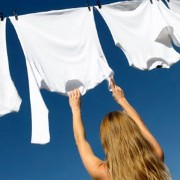 Photo: Getty Images
Photo: Getty Images
The Ranger Online of San Antonio College recently came out with an article by Kristina Coble concerning the Clothesline Project and its connection to the fact that October is Domestic Violence Awareness Month.
The Nontraditional Student Club of San Antonio College is planning an event which will literally and symbolically shed light on violence against women.
Survivors of domestic violence are invited to decorate a T-shirt that will be exhibited in Loftin Student Center. This is part of the Clothesline Project which "is an international campaign against domestic violence that provides a way for survivors to voice their pain using art," according to Kristina Coble.
The project's website describes the hanging of these T-shirts as a "healing mechanism." Survivors can literally walk away from their pain.
These T-shirts will be displayed on a clothesline on Oct. 25 on the stairs in the Loftin Student Center at San Antonio College.
Ana Marchand-Maya, president of the Nontraditional Student Club at the college says, "Don't be afraid or ashamed. It's important to let out their voice."
Family members, friends, and survivors of course, are invited to decorate a shirt as a way of raising awareness and of helping those women who have suffered violence.
According to Clotheslineproject.org, almost as many women died during the Vietnam War from domestic violence as soldiers died.
Rachel Carey-Harper, an artist and advocate of the movement, came up with the idea of shirts hanging on a clothesline because she thought that this represented the "essence" of the campaign. Women have traditionally talked over backyard fences, while hanging their laundry.
Presently, there are about 500 national and international projects.
For more information, contact President Ana Marchand-Maya or Jimenez at 210-486-0455.





Add a Comment3 Comments
October is Domestic Violence Awareness Month and throughout the month domestic violence advocates and the media's attention will be focused on bringing more awareness to and promoting the eradication of men’s violence against women. However, not all intimate partner violence (IPV) fits into this neat little package.
IPV against men has always been a hot button issue. The mere mention of male victims in a gathering of traditional domestic violence advocates creates great controversy. While domestic violence advocates may know men are victims they insist that their victims service agencies (over 2,000 of them in the US) should focus exclusively on ending violence against women by men because women are the most injured and prevalent victims. As a result, serious outreach and services for the male victims of IPV are sorely lacking.
Studies indicate that men are victims of assault by their partners in 25% of the reported cases in the U.S. each year. The disparity between the needs of those victims and the services available is large. The gap must be closed and that can only be done through education, services and advocacy.
While resources for men are still scarce, awareness is increasing and hopefully more services will follow. IPV is not a gender issue, it is simply a human issue.
We envision a world where services are available to victims and survivors without prejudice.
Call: 1-888-7HELPLINE (1-888-743-5754)
Visit: www.dahmw.org
Sincerely,
Jan Brown, Founder and Co-Director
October 15, 2010 - 3:39pmHeather Fortune, Co-Director
Domestic Abuse Helpline for Men and Women
Office: 866-786-0758
Loree Cook-Daniels and Michael Munson
FORGE Transgender Sexual Violence Project
P.O. Box 1272
Milwaukee, WI 53201
414-559-2123
www.forge-forward.org
This Comment
This resource is called "EmpowerHER." While nobody would deny that men are sometimes victimized, there needs to be spaces to speak about male violence to women - which is still the greatest form of human rights violation in the world - without hearing "what about the men?" You make the point that services service women because advocates say they are the most prevalent victims. They are - it is not discrimination to say so, and it is not their fault that services for men are sorely lacking when they are up to their eyeballs servicing the women and children men have harmed.. Men need to work to generate services for battered men without damning battered women's services, and without pretending that the problem of battered men goes anywhere near the scope of the problem of battered women.
December 15, 2010 - 4:46amThis Comment
Thank you both so much for sharing this information.
October 15, 2010 - 5:02pmThis Comment